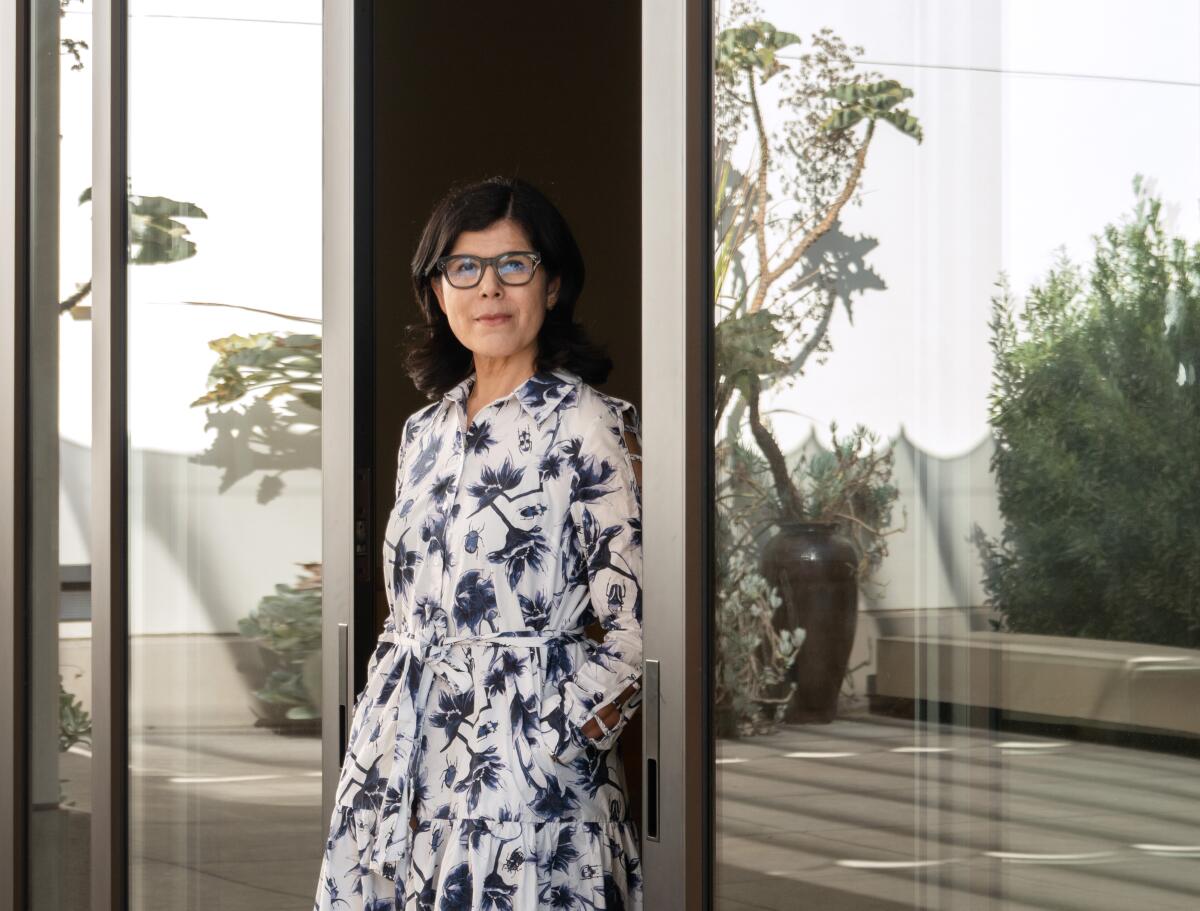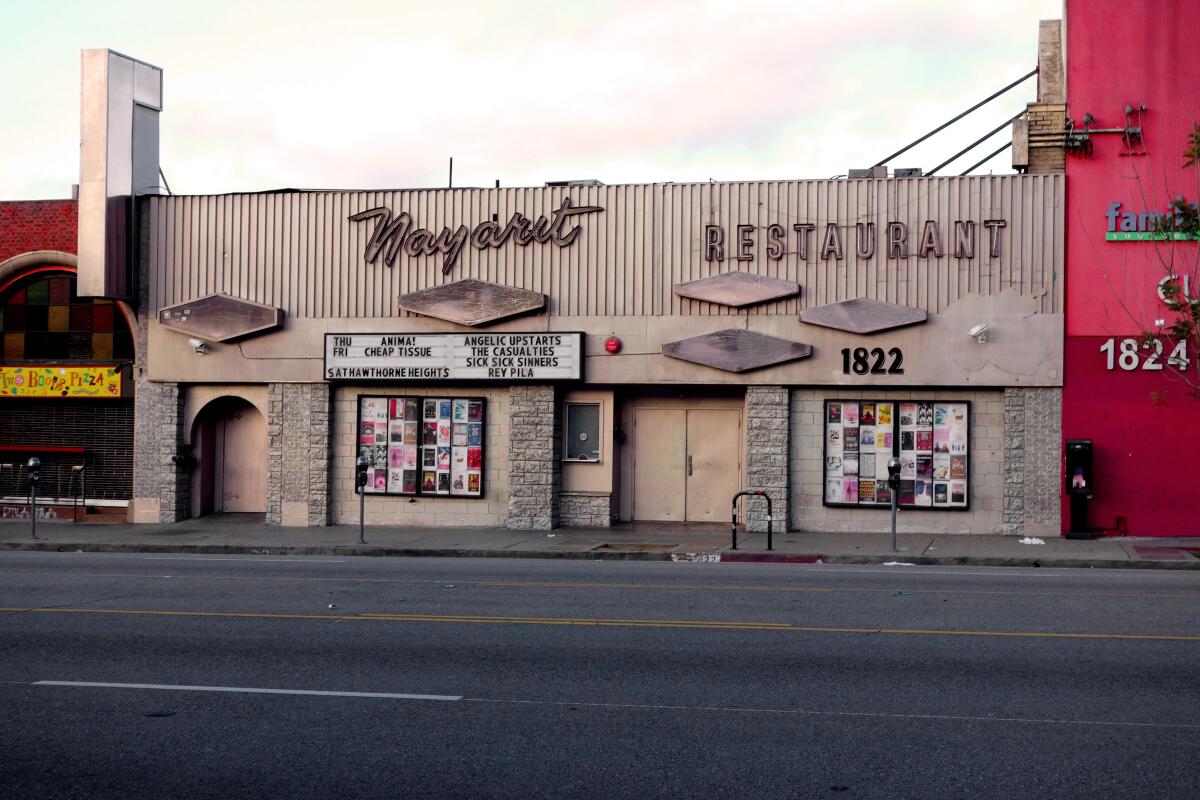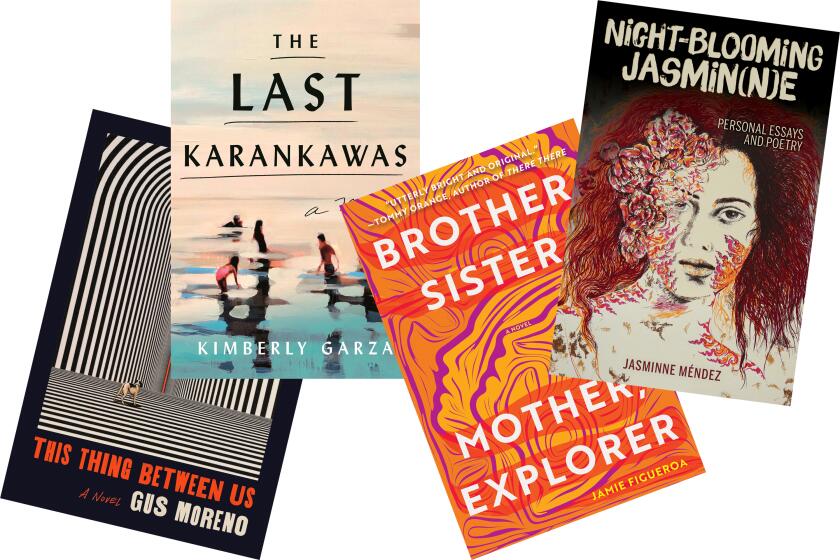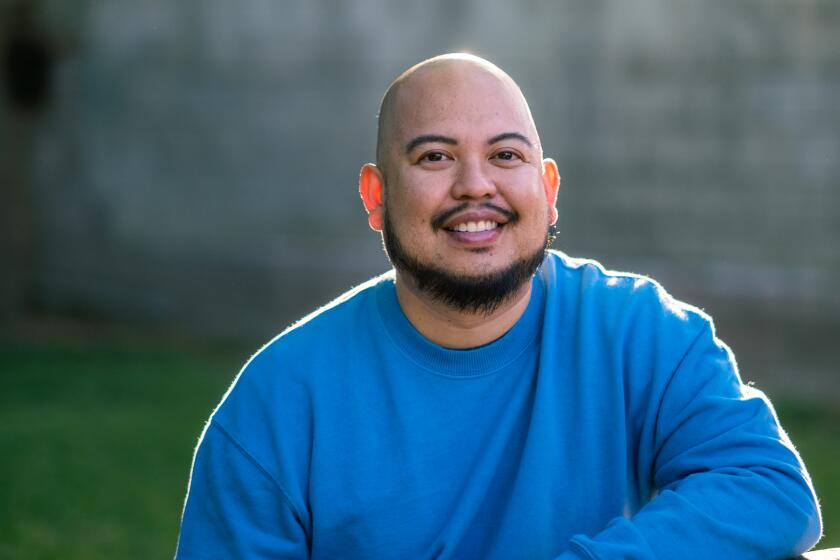USC historian Natalia Molina is reframing how we think about race

- Share via
For all of Natalia Molina’s life, the sight of the San Gabriel Mountains has meant one thing above all: She’s home.
They loomed over the Echo Park house she grew up in. She sees them outside her office window at USC, where Molina is a distinguished professor of American studies and ethnicity. They rise above the landscapes and buildings of the Huntington Library, Art Museum, and Botanical Gardens, where she’s the interim director of research. They welcome her home from travels to give lectures around the world.
“They’re a sign that I’m connected to Los Angeles,” Molina, 51, told me recently at the Huntington. “That [my family has] been for generations, and that I respect those who came before me” — the immigrants, the Indigenous peoples of these lands. “They’re symbolic of being grounded and of knowing my purpose.”
During our interview, Molina alleged that she’s boring. This is not true. She is clever and surprisingly funny even when talking about serious things — from structural racism in immigration policy to the tios, tias and ancestors who have shaped her studies and her life. Among them were strong women like Doña Natalia Barraza, her late grandmother and the inspiration for Molina’s latest book, “A Place at the Nayarit: How a Mexican Restaurant Nourished a Community.”

An immigrant who came to the U.S. from Mexico alone, with little money and no English, Barraza established the successful and beloved Echo Park restaurant and ran it for more than 20 years. It was more than a place to eat: It was what Molina calls an “urban anchor,” a place where Mexican workers and other customers connected to their cultures and identities.
“I stand on the shoulders of Natalia Barraza, all the women in my family, and those that came before us,” Molina says.
Telling the history of under-documented communities is at the heart of Molina’s work, which earned her a MacArthur fellowship in 2020. She uses stories like Barraza’s to explain how immigrants and other marginalized groups build communities. Her first book, “Fit to Be Citizens?” reveals how science and public health influenced the meaning of race in the early 20th century. In “How Race Is Made in America,” she introduces “racial scripts,” a central theory in her work that explains how the lives of different racial groups affect one another across time and space.
She also coined — and wrote a book about — “relational formations of race,” essentially the idea that racial designations are formed relative to whiteness and each other, socially constructed around established hierarchies.
Our inaugural LA Vanguardia class is an amazing array of Latino talent shaping the movies, TV, music, fine arts and literary scene of today — and tomorrow.
“She relentlessly employs this ‘relational lens’ to help us understand the complexities of race,” said historian Kelly Lytle Hernández in an email.
Molina’s work has advanced our understanding of how ideas of race and citizenship were produced and politicized and how they influence the way we regard one another today. How we fill out the census, whom we consider white or fully American — none of it is natural or accidental, she argues.
“In a world that seems to spin toward unintelligible diversity and irreconcilable difference, professor Molina’s work is crucial, providing a framework for conceptualizing how the inequities of the modern world are woven together at their historical root,” Hernández added.
It was more than Molina’s direct lineage that influenced her life’s work. It was also Echo Park. She grew up and went to school alongside Filipinos, Chinese immigrants, Vietnamese refugees, Irish working-class whites. She was amazed by how dynamic Latino identities were (and are), always changing across time and space.
“I was really interested in how what it means to be Latino or Mexican is really shaped by my working-class neighbor, by what it means to be an immigrant in a different way than what it means to be a refugee,” Molina said. “So it was Echo Park that really got me thinking about what I now, as an academic, call race relationally.”
When asked what motivates her, she talked about the “fire in your belly” that rumbles up when communities are sidelined or overlooked. She offered a recent example: As many Americans got COVID-19 vaccines and federal financial support, millions of immigrants were falling through the cracks.
She remembered during the 2020 wildfires seeing images in newspapers of farmworkers toiling under smoky, neon-orange skies and reading about Mexicans coming to San Diego to get COVID-19 vaccines. “People were outraged” about the vaccines, she recalled, “but there is no outrage when they come from Tijuana to clean our houses or pick our produce. Those are the kinds of things that seem very hypocritical and that motivate me to do this kind of work.”
Los Angeles author shares a collection of works by Latino authors, some well known, others making their debut.
Molina is currently working on a new book about the Mexican workers who built the Huntington, a place she started visiting in 1998 as a researcher. Most of the research is done; now she has to write.
She remembered once inviting her father, a Mexican immigrant with an eighth grade education, to the Huntington for lunch. “It’s so beautiful here,” he said after walking through the gardens.
“Yes, but it can also be a little intimidating when you’re the first person in your family to be in a place like this,” she responded.
“Why, mija?” he leaned in and asked her. “We built this place.”
That line still gives her chills. She’s become acutely aware of the privilege she has accrued as an academic.
“I don’t think I get to do that anymore — to kind of sit back,” Molina said. “If I sit back, I hold back others.” With her teaching, she hopes to do the opposite.
“I don’t really believe in tapping pipelines, I think we have to build them,” she says. “There’s just not enough of us. Once you’re in that position, you really need to know that this isn’t about you.”
When she’s not writing books, bashing stereotypes or building pipelines for students of color, Molina likes to read (mostly autobiographies), go to Dodgers games and hike. This year, she hiked all 96 miles of Scotland’s West Highland Way.
In the evenings, she walks Lefty, her 13.1-pound terrier mix, and thinks through fresh ideas. She records voice messages for herself or others. “I’m known for my voice memos,” she admitted, laughing. (It’s true. I’ve received a few myself.)
Other times she sits on the porch of her Pasadena home, watching the San Gabriel Mountains.
Scholar Anthony Christian Ocampo talks about drawing on his earlier years as a queer Filipino from Eagle Rock for his book ‘Brown and Gay in LA.’
Sign up for our Book Club newsletter
Get the latest news, events and more from the Los Angeles Times Book Club, and help us get L.A. reading and talking.
You may occasionally receive promotional content from the Los Angeles Times.







